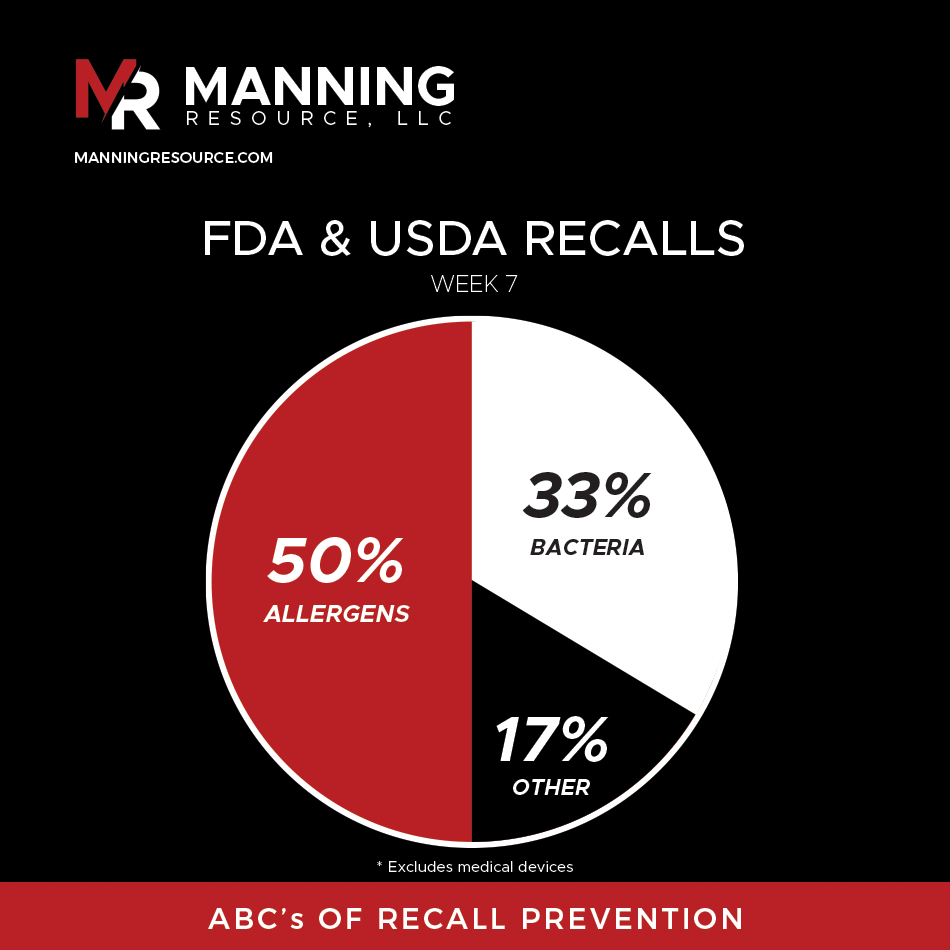Recent Food & Beverage Recalls: What You Need to Know
Food safety remains a top priority for manufacturers, regulators, and consumers alike. In the past week, multiple recalls have been issued due to undeclared allergens, potential foodborne illness risks, and regulatory missteps. Here’s a breakdown of the latest recalls and what they mean for consumers and industry professionals.
Undeclared Allergens: A Persistent Challenge
Mauna Loa Milk Chocolate Covered Macadamias – Undeclared Almonds (2/15/25)
An internal quality control process at Mauna Loa identified that a batch manufactured by a third-party co-packer contained undeclared almonds. The company quickly took steps to contain the affected product, notify consumers and distributors, and report the issue to the FDA. This underscores the importance of rigorous supplier oversight and allergen control measures. Source
Raisin Bran Muffin – Undeclared Walnuts (2/14/25)
A mislabeling issue was discovered when a retail location reported the error. The affected muffins, which contained walnuts but were not labeled as such, were promptly removed from store shelves. This case highlights the need for thorough label verification procedures to prevent allergic reactions among consumers. Source
Botulism Risk: A Serious Concern
Menma Ajitsuke Prepared Bamboo Shoot – Improper Storage & Labeling (2/12/25)
A potential botulism risk was identified when this product was found being sold under non-refrigerated conditions. The absence of a required “Keep Refrigerated” label may have contributed to the hazard. Retailers acted swiftly to remove the product, and consumers were advised to discard or return it for a full refund. This incident serves as a reminder of the crucial role proper storage instructions play in food safety. Source
Canned Tuna – Seal Integrity Concerns (2/10/25)
A voluntary recall was issued due to a manufacturing defect in the “easy open” pull-tab can lids, which could compromise the product seal. Affected cans may leak over time, leading to possible Clostridium botulinum contamination, a potentially fatal foodborne illness. This recall emphasizes the importance of robust packaging quality controls in preventing food safety risks. Source
Regulatory & Labeling Issues
Ready-to-Eat Meat & Poultry Pasties – Misbranding & Undeclared Egg (2/12/25)
Routine labeling review activities by FSIS uncovered that a ready-to-eat meat and poultry product contained egg but failed to declare it on the label. Labeling errors can have serious consequences, particularly for consumers with allergies. This case reinforces the necessity of thorough compliance checks before products reach the market. Source
Beef Tallow – Produced Without Inspection (2/12/25)
A local health department reported that beef tallow products were being processed, packaged, and labeled without federal inspection. The inclusion of a nutrition facts label falsely suggested that the product was safe for human consumption, despite the manufacturer lacking the necessary USDA authorization. This incident underscores the importance of regulatory compliance to protect consumers from potentially unsafe products. Source
Key Takeaways for the Food Industry
- Supplier Oversight: Manufacturers must ensure third-party co-packers adhere to strict allergen control and labeling protocols.
- Labeling Accuracy: Mislabeling continues to pose a major risk, particularly for allergen-sensitive consumers.
- Storage & Handling Compliance: Improper storage conditions and missing refrigeration instructions can lead to serious foodborne illness concerns.
- Packaging Integrity: Defects in packaging materials can compromise food safety, emphasizing the need for preventative testing.
- Regulatory Compliance: Products must meet inspection and labeling requirements to ensure consumer safety and regulatory adherence.
As recalls continue to emerge, food manufacturers, retailers, and consumers must stay informed and vigilant. Proactive measures, such as thorough quality assurance checks and regulatory compliance reviews, can help prevent future recalls and protect public health.




Add Comment